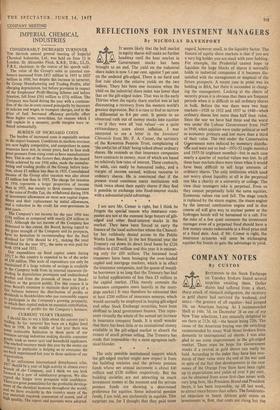REFLECTIONS FOR INVESTMENT MANAGERS
By NICHOLAS DAVENPORT IT seems likely that the bull market in equity shares will make no further 4/4. headway until the bear market in Government stocks has been brought to an end. The yield on the industrial share index is now 5.4 per cent. against 5 per cent. on the undated gilt-edged. There is no hard and fast rule about the relative yields on the two indices. There has been one occasion when the yield on the industrial share index was lower than that on the gilt-edged index. That was in the early Thirties when the equity share market was at last discounting a recovery from the western world's greatest depression. But it is rare to find so narrow a differential as 0.4 per cent. It points to an abnormal rush out of money stocks into equities —:as if they were all 'real values'—on a quite extraordinary scare about inflation. I was interested to see a letter in the Investors' Chronicle from Mr. F. A. Comer, the secretary of the Rowntree Pension Trust, complaining of `the awful lot of blah' being talked about ordinary shares. He reminds us that insurance companies have contracts in money, most of which are based on relatively low rates of interest. These contracts, he adds, can easily be honoured today, and a margin of income earned, without recourse to ordinary shares. He is convinced that if the present trend continues many institutions will think twice about their equity shares if they find it possible to exchange into fixed-interest stocks with a substantial•yield advantage.
I am sure Mr. Corner is right, but I think he forgets the special reason why insurance com- panies are not at the moment large buyers of gilt- edged and other fixed-interest stocks in the market. They have been forced to carry the finance of the local authorities whom the Chancel- lor has ruthlessly denied access to the Public Works Loan Board. In the last financial year the Treasury cut down its direct local loans by £226 million to £102 million and this year it is estimat- ing only for £89 million. The harassed local treasurers have been besieging the over-loaded capital and mortgage markets, which is in effect the insurance companies, and the queue of would- be borrowers is so long that the Treasury has had to forbid applications of less than £3 million in the capital market. (This merely commits the insurance companies more heavily in the mort- gage market.) It may therefore be estimated that at least £200 million of insurance moneys, which would normally be employed in buying gilt-edged and other Stock Exchange securities, have been diverted to local government finance. This repre- sents virtually the whole of the annual net increase in insurance company funds. It is small wonder that there has been little or no institutional money available in the gilt-edged market to absorb the stream of small private selling. The Treasury has made that impossible—by a most egregious tech- nical blunder.
The only possible institutional support which the gilt-edged market might now expect is from the building societies and the private pension funds whose net annual increment is about £40 million and £120 million respectively. But the building societies are not attracting so much investment money at the moment and the private pension funds are showing a determined preference for equities. Some industrial pension funds, I am told, are exclusively in equities. This surprises me, for I thought that they paid some regard, however small, to the liquidity factor. The feature of equity share markets is that if you are a very big holder you are stuck with your holding. For example, the Prudential cannot hope to liquidate the huge blocks of shares it normally holds in industrial companies if it becomes dis- satisfied with the management or sceptical of the future prospects. A recent case in point was its holding in BSA, but there it succeeded in chang- ing the management. Looking at the charts of security prices it is obvious that there are frequent periods when it is difficult to sell ordinary shares in bulk. Before the war there were two bear markets-1928 to 1932 and 1937 to 1940—wheAt ordinary shares lost more than half their value. Since the war we have had three and the worst was under the Labour Government from 1947 to 1949, when equities were under political as well as economic pressure and lost more than a third of their value. The two under the Conservative Gsyernment were induced by monetary disinfla- ti6n and were not so bad-1951-52 (eight months) and 1955-56 (eighteen months)—but in each case nearly a quarter of market values was lost. In all these bear markets there were times when it would have been difficult to sell large amounts of ordinary shares. The only institution which need not worry about liquidity at all is the perpetual one like a charity or a university or college. The view their managers take is perpetual. Even so they cannot perpetually hold the same equities. Economic values .rise and fall. The stage coach is replaced by the steam engine, the steam engine by the internal combustion engine and in due course oil will give way to nuclear power or the hydrogen bomb will be harnessed to a cab. For the sake of a few quiet moments the investment manager even of a perpetual fund should have a few money stocks redeemable at a fixed price and at a fixed date. And, if Mr. Comer is right, the insurance actuaries will soon be exchanging equities for bonds to gain the advantage in yield.


































 Previous page
Previous page